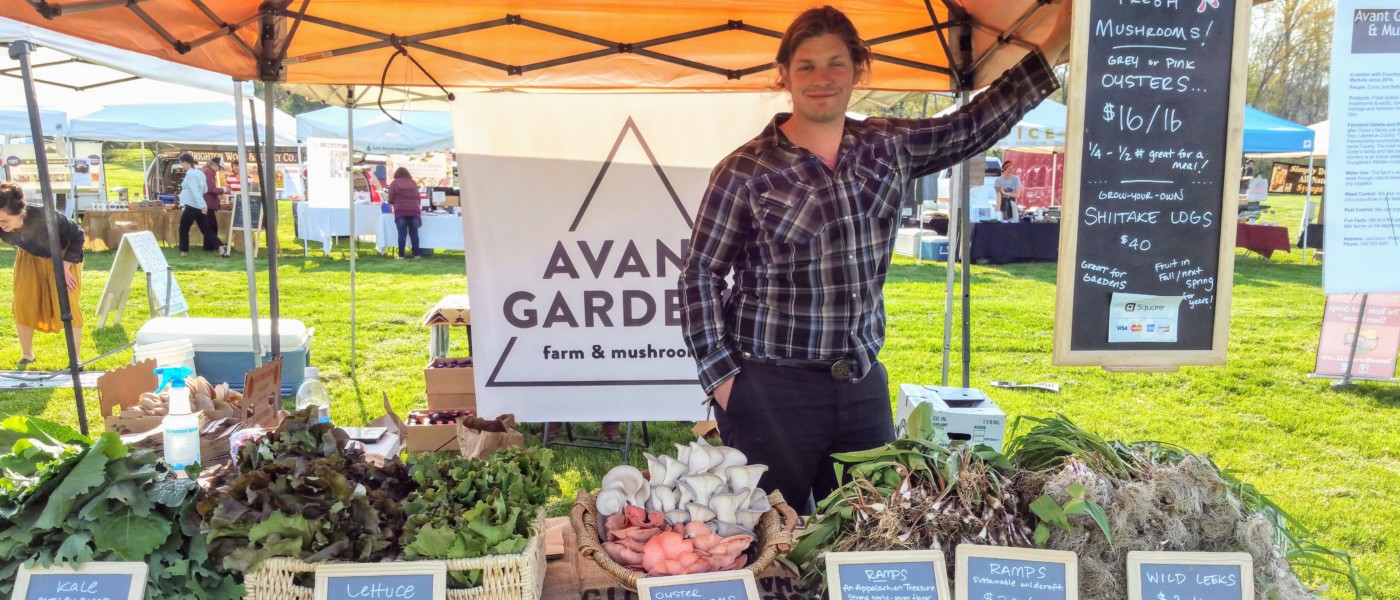Being involved with food has been Corey Maizel’s dream since he started gardening with his grandfather as a child. Corey worked as a chef during college but found that it wasn’t for him. It wasn’t so much the high stress and poor pay that bothered him, but being stuck inside. He left the culinary world with his zeal for food intact, and made the decision that farming would be his next pursuit.
Almost a decade later, Corey has had experience on many farms—as a farmhand, a manager, and now as an owner. He and his wife Bethany started Avant Gardens Farm & Mushroomery in 2015. The mushroomery is located in Youngstown, Ohio, and the farm is just over the border in Mahoning Township, Pennsylvania. Moving back to the region after time spent in Denver, they were shocked at the quality of farmland in the area. Not many farmers they knew were moving to the relatively urban area of northeastern Ohio. But according to Corey, “The farmland out here is gorgeous.” Its fecund soil has well-balanced pH and is rich in nutrients. “Successfully raising crops in much poorer soil out west made Corey realize what we had taken for granted back east in Ohio: the ease and quality that comes out of rich soil that doesn’t require significant amendment,” says Bethany.
The Maizels have also found that they had taken for granted the availability of water in Ohio. Their twenty-two-acre plot is nestled in the foothills of the Allegheny Mountains, which bring heavy rain once or twice a week, but protect the farm from major winds. “I have springs that pop off the corners of my fields that look like mythical springs,” Corey raves. “I have water everywhere. I don’t have to irrigate!” With a wealth of natural resources that you’d be hard pressed to find anywhere else, the land is idyllic.
Corey and Bethany think northeastern Ohio is perfect for a small farm like theirs to put down roots. “This area is one of the secret goldmines of agriculture,” Corey confides. “A lot of people don’t want to be here because the Rust Belt has a bad connotation, but for running and owning a business, it’s a beautiful place to be.”
And location is everything for them. Avant Garden Farms is smack in the middle of four cities that are eagerly eating locally and looking for more. Chicago and New York are six hours to the west and east, respectively. Pittsburgh, what Corey calls the “diamond of the Rust Belt,” is fifty minutes from the farm. Cleveland, seventy minutes in the opposite direction, is also having a “food moment.” These cities give small farms like Avant Gardens opportunities to meet rising demand.
However, as Corey found out, there is a caveat to the growing appetite for local food: the need for garden-variety produce has already been met. During this past growing season, Corey grew twenty-three different types of winter squash, fourteen types of melons, and some very exotic peppers, along with your more typical farmers market items. Though his produce was of the highest quality, he found the competition to sell his harvest was fierce. Instead of growing fruits and vegetables again, Corey is looking to appetites that have not yet been sated. Over the next three years, he’s turning his fields over to berry production, a crop that he says is woefully rare in his area. He’ll be at the forefront, growing currants, gooseberries, jostaberries, and honeyberries.
Having face-to-face interactions with customers is vital, he says, because most Americans don’t eat mushrooms very often. When marketgoers tell Corey that they don’t like mushrooms, he tells them he doesn’t believe them.
Though Corey struggled to sell his produce this season, the mushroom side of his operation saw exponential growth—his production tripled in the past year! While he waits for his berry fields to mature over the next few years, Corey will focus on cultivating his mushroom operation. Mushrooms have become the farm’s identity.
Bethany is Corey’s biggest champion. She describes Corey’s practical knowledge as the farm’s biggest asset: “He was able to pivot because of his wide array of experience growing a variety of crops and in a variety of situations. Mushrooms are a totally different thing from raising crops, but Corey’s deep experience gave him the tools to manage it.”
Bethany runs a perishable shipping company, easing distribution to the restaurants and grocers that buy from them online. Yet, for the most part, Corey sells locally. He has a presence at four farmers’ markets in the area where he sells mushrooms and value-added products like mushroom butter and mushroom and herb salt mixes. Having face-to-face interactions with customers is vital, he says, because most Americans don’t eat mushrooms very often. When marketgoers tell Corey that they don’t like mushrooms, he tells them he doesn’t believe them. “I say it’s because they’ve never had good mushrooms. A lot of people have had buttons, portabellas and criminis; those are all very closely related mushrooms.” The fungi that Corey cultivates are extremely different and diverse: from pioppinos to oyster mushrooms. Most folks have never had a pink oyster, let alone know what a lion’s mane mushroom tastes like. Corey’s excitement entices first time customers to try them; he’s had many mushroom converts that way.
As a city, Youngstown has seen better days. In its heyday, it had a population triple its current size and a thriving steel sector. But just like Pittsburgh, an effort to revitalize the city’s post-steel economy is looking bright. Moving from Denver seemed like a risk but Corey says, “We did the metrics and Youngstown is a very good place to run a business.” Like many old steel mill cities, Youngstown has a plethora of cheap warehouses, making it an ideal spot for a burgeoning mushroom business. Corey’s operation is currently three thousand square feet of warehouse space, and he’s hoping to continue expanding. The cheaper cost of real estate there allows him to pay all of his employees a living wage, an ethical decision he says he’ll never compromise on. “Wages from the eighties won’t cut it these days,” he says. “If you want to see the change, then be the change.”
Corey says he learned more about being a small business owner by watching his father than he did in his one college semester as a business major. His approach is about reading people’s desires and meeting a growing open market. “Being in the business of food is being in the business of what people want. You can say, ‘Man, I really like barbecue sauce; I’m going to make barbecue sauce.’ But how many other people are making barbecue sauce?” As much as Corey would love to produce cut flowers and heirloom winter squash, he has committed to prioritizing the needs of his community. He hopes other young farmers will ask themselves what the need is in their own communities before they start producing crops that are not profitable in their marketplace.
As Corey sees it, supporting local farmers is the most impactful way to get better produce into markets and stores, and ultimately to meet the needs of a community. “Supporting agriculture in your region…that’s going to help a lot more than anything else.”







